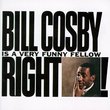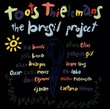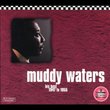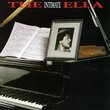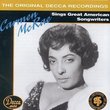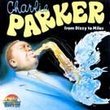| All Artists: Michel Legrand Title: Legrand Jazz Members Wishing: 0 Total Copies: 0 Label: Polygram Records Release Date: 10/25/1990 Genres: International Music, Jazz, Pop, Soundtracks Styles: Europe, Continental Europe, Smooth Jazz, Swing Jazz, Bebop, Dixieland Number of Discs: 1 SwapaCD Credits: 1 UPC: 042283007420 |
Search - Michel Legrand :: Legrand Jazz
 | Michel Legrand Legrand Jazz Genres: International Music, Jazz, Pop, Soundtracks
Japanese only SHM-CD (Super High Material CD - playable on all CD players) pressing. Universal. 2008. |
Larger Image |
CD DetailsSynopsis
Album Description Japanese only SHM-CD (Super High Material CD - playable on all CD players) pressing. Universal. 2008. Similar CDs
Similarly Requested CDs
|
CD ReviewsNo slight to the French, but this is a minor work in the ric Samuel Chell | Kenosha,, WI United States | 04/11/2009 (4 out of 5 stars) "Legrand is one of those polymath musicians who fits in the same category as Andre Previn and Leonard Bernstein--a composer of classical musical forms and film scores (200 in Legrand's case), a swinging pianist capable of taking the stage with Oscar Peterson (which he did) and of playing jazz sets (at Shelly Manne's Manhole in the '50s and a NYC club in 2008), and a great popular songwriter (perhaps one of the several best of the past 40-50 years). As clever and fresh as the arrangements on this collection are, as distinguished as are the individual musicians, I must take exception with those reviewers who proclaim it the best recording of the '50s. Even if we rule out Blue Note, Riverside, Emarcy, Verve, Contemporary, Pacific Jazz, etc., this album is not even among the top ten Columbia recordings. The album's strength--its variety and range (LeGrand is careful to encompass the spectrum of jazz history in his selection of tunes)--is also its weakness.
Rather than a mere "taste" of Miles or whomever, I would much rather go for the undiluted complete package of such Columbia classic '50s recordings as "Jazz Goes to College" (Brubeck), "'Round Midnight" (Miles), "Newport '56" and "Such Sweet Thunder" (Ellington), "Blue Rose" (Duke and Clooney), "Blue Trombone" (J.J. Johnson), "Concert by the Sea" (Garner), "The Jazz Messengers" (Blakey and Silver both at their best), "Louis Armstrong Plays W. C. Handy" (one of several Columbia indispensables by Pops), "Miles Ahead," "Porgy and Bess," "Sketches of Spain" (Gil Evans with Miles), "Lady in Satin" (Billie Holiday with full string orchestra), the "Hi Los and All That Jazz." And these are just a few quick examples from the Columbia catalog that come to mind. Yet in this year when the Blue Note story has caused many to rediscover that fabled company (2009 is the 70th Anniversary of the label), its contributions to the African-American art form of jazz are relatively limited compared to the seminal recordings produced by George Avakian and Columbia. Columbia, fortunately, sold enough jazz records to invite creative projects such as this Legrand album, but there were others--equally deserving endeavors--that haven't even been reissued: Jon Hendricks' "Evolution of the Blues," Duke's "A Drum Is a Woman," Andre Previn and J. J. Johnson's album of Kurt Weil songs. And finally in this year of its 50th anniversary, we come to the most successful recording of all time--both commercially and artistically (in fact, it's hard to think of a more influential and vital recording): Miles' "Kind of Blue." Of all my early Columbia LPs, this one gets the fewest plays. The arrangements are original, the playing is first-rate, but all of these tracks are essentially "face-lifts" of the original recordings, none of which is eclipsed by LeGrand's re-imagining of it." |

 Track Listings (11) - Disc #1
Track Listings (11) - Disc #1




